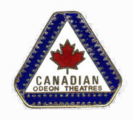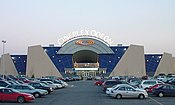Cineplex Odeon Corporation
 | |
| Formerly | Cineplex Corporation (1979–1984) Cineplex Odeon Corporation (1984–2011) |
|---|---|
| Company type | Subsidiary |
| Industry | Entertainment (movie theaters) |
| Predecessors | Loews Cineplex Entertainment |
| Founded | April 19, 1979 (as Cineplex Corporation) January 1941 (Odeon Theatres of Canada) |
| Headquarters | Toronto, Ontario, Canada |
Areas served | Canada, United States |
Key people | Garth Drabinsky and Nat Taylor |
| Parent | Loews Cineplex Entertainment (1998–2003) Cineplex Galaxy (2003-present) |
| Subsidiaries | Cineplex Odeon Films Cineplex Odeon Home Video |
'Cineplex Entertainment Corporation[1], formerly known as Cineplex Odeon Corporation and Cineplex Corporation’, is a Canadian subsidiary of Cineplex Entertainment. Prior to its acquisition by Onex Corporation, it was one of North America's largest movie theatre operators, with theatres in its home country of Canada and the United States. The Cineplex Odeon Theatres are now operated by Cineplex Entertainment in Canada and as AMC Theatres in the United States.[2] The company was the result of a merger between Cineplex Corporation and Canadian Odeon Theatres in 1984. Canadian Odeon Theatres was the result of a merger between Canadian Theatres and Odeon Theatres of Canada in 1978.
History
Odeon Theatres of Canada
The oldest ancestor of Cineplex Odeon was Odeon Theatres of Canada, started as "Generals Theatre Corporation" by Paul Nathanson, son of Famous Players Canadian Corporation president Nathan L. Nathanson. The "Odeon Theatres of Canada" name was first used in January 1941. The elder Nathanson was rumoured to be involved in the chain, but it was not until early May 1941 that he resigned (for the second time) from Famous Players Canadian and acknowledged his position in creating and operating Odeon. The chain, initially composed of independent theatres, was not originally affiliated with the British "Odeon Cinemas" circuit; it was sold to the British chain's owners, the Rank Organisation, in 1946. Following World War II, there was a wave of anglophilia in Ontario; Odeon emphasised its British ownership to capitalize on this sentiment, screening British films—particularly those made by Rank.[3]
Odeon Theatres of Canada merged with the Canadian Theatres chain in 1978, becoming known as Canadian Odeon Theatres.
Acquisition by Cineplex Corporation
Cineplex Corporation began operating in 1979. On April 19, 1979, Nathan "Nat" Taylor, inventor of the multiscreen theater, and Garth Drabinsky opened the first Cineplex location, an 18-screen complex in the basement of the Toronto Eaton Centre. At the time, the theatre's 1,600 seats earned it a place in the Guinness Book of World Records.[4]
After successfully challenging the Famous Players/Canadian Odeon duopoly and their exclusive contracts with major studios, in 1984, Cineplex bought Canadian Odeon Theatres, to become Cineplex Odeon.[5] The Bronfman family was a major investor in the purchase.[4] In 1985, Cineplex bought the Plitt Theatres chain (previously United Paramount Theatres and ABC Theatres). In 1986, Cineplex Odeon bought Essaness Theatres (a Chicago area chain founded in 1929 by Edwin Silverman and Sidney Spiegel of the Spiegel catalog family), Neighborhood Theatres of Virginia, and the RKO Century Theatres chain (previously Century Theatres [a New York area chain] and RKO Stanley Warner Theatres).[6][7] Also, in 1986, when federal regulations had been relaxed, MCA (owners of Universal) purchased a stake in Cineplex Odeon. In 1987, Cineplex acquired the Walter Reade Organization from The Coca-Cola Company.[8]
In 1986, the corporation established a film distribution outlet, Cineplex Odeon Films, and a home video distribution outlet, Cineplex Odeon Home Video (Later Cineplex Odeon Video) replacing Pan-Canadian Video Presentations. It distributed all titles in Canada on MCA's behalf, but the film distribution outlet ceased operation in 1997 and the home video outlet a year later after MCA was renamed as Universal Studios.
Cineplex Odeon had grown to become one of the largest film exhibitors in North America by 1993, with 1,630 screens and operations in 365 locations within North America. At this point, Cineplex Odeon accounted for roughly 8% of box office revenues in North America, competing mostly with Famous Players in the Canadian market. Cineplex Odeon and Famous Players were two dominant forces in the Canadian film industry, with both organizations accounting for roughly two-thirds of the industry's annual revenues. The key to the success of the two organizations was in large part due to their supply chain. Cineplex Odeon had exclusive first-run rights to films made by Columbia and Universal Studios, which allowed them to seize a hefty market share.[9]
Controversy surrounded the practices of both Cineplex Odeon and Famous Players in 1998. The two companies had been accused of operating as a duopoly, and choking off the film supply so smaller theatres could not show the same products. [10]
In April 1998, Cineplex Odeon Theatres merged with New York City-based Loews Theatres (founded in 1904 by Marcus Loew) to form Loews Cineplex Entertainment.[11][12] Alliance Atlantis purchased Cineplex Odeon Films assets along with its home video division the same year.[13]
Post Loews Cineplex Entertainment
After the merger the company ceased to exist and was merged into the operations of Loews Cineplex Entertainment. In 1999, Ellis Jacob and Steve Brown, former executives who left Cineplex Odeon Corporation during the ownership change, created Galaxy Entertainment designed to bring big-city entertainment to mid-sized markets across Canada. In 2001, Loews Cineplex Entertainment, the company that merged with Cineplex Odeon, filed for chapter 11 bankruptcy. Lowes Cineplex was later acquired by Onex Corporation and Oaktree Capital Management in 2002. In 2004, Onex decided to sell Loews Cineplex and retain the Canadian operations, merging then with Galaxy to form Cineplex Galaxy Income Fund (now Cineplex Entertainment).[14]
Gallery
-
The logo used by Odeon Theatres of Canada, the same logo used by its British parent company, Odeon Theatres.
-
The logo of Canadian Odeon Theatres.
-
The logo of the Cineplex Corporation.
-
The logo of the Cineplex Odeon (1984–1998).
-
The logo of the Cineplex Odeon (1998–2009).
-
The Cineplex Odeon at Eglinton Town Centre in Toronto.
See also
References
- ^ http://irfiles.cineplex.com/reportsandfilings/annualinformationform/2010/2011%2003%2031%20aif%20final.pdf
- ^ "AMC Entertainment Inc. and Loews Cineplex Entertainment Corporation Complete Merger" (Press release). AMC Entertainment. Archived from the original on 2008-02-09. Retrieved 2008-01-24.
- ^ Moore, Paul S. (Fall 2003). "Nathan L. Nathanson Introduces Canadian Odeon: Producing national competition in film exhibition" (PDF). Canadian Journal of Film Studies. 12 (2): 22–45. doi:10.3138/cjfs.12.2.22. Retrieved 2010-11-11.
- ^ a b Wise, Wyndham (May 2001). "From The Editor". Take One. 10 (32). Canadian Independent Film & Television Publishing Association: 7. ISSN 1192-5507. Retrieved 2010-11-11.[permanent dead link]
- ^ Westell, Dan (29 May 1984). "Cineplex set to buy out Odeon". The Globe and Mail. Toronto. ProQuest 386541608.
- ^ Gomery, Douglas (1992). Shared Pleasures: A History of Movie Presentation in the United States. Madison, Wisconsin: University of Wisconsin Press. pp. 110–111. ISBN 0-299-13214-5.
- ^ "Movie Theater Tests TV Technique". The New York Times. October 2, 1984.
...whose father, Edwin, founded Essaness in 1929 with a member of the family that owned Spiegel Inc.
- ^ "Cineplex to buy N.Y. theater chain". United Press International. March 19, 1987.
- ^ Acland, C. (1998). The Cultural Industries in Canada: Problems, Policies and Prospects. Canadian Journal of Communication, 23(4). doi:https://doi.org/10.22230/cjc.1998v23n4a1068
- ^ Shecter, B. (1998, Dec 16). Adventures in the screen trade cineplex odeon and famous players have run the movie theatre business pretty much their own way. but, with the launch of AMC entertainment's first canadian 'megaplex,' things are about to change. National Post Retrieved from https://search.proquest.com/docview/329288307
- ^ Liu, Robert (30 September 1997). "Loews, Cineplex to merge". CNNMoney.
- ^ Franklin, Stephen (17 April 1998). "Theater Sales To Pave Way For Loews, Cineplex Odeon Merger". Chicago Tribune.
- ^ September 18, y Hoffman; 1998. "Odeon operating independently". Retrieved 2019-08-06.
{{cite web}}:|last2=has numeric name (help)CS1 maint: numeric names: authors list (link) - ^ "Corporate Information". Cineplex. Retrieved 1 August 2018.




